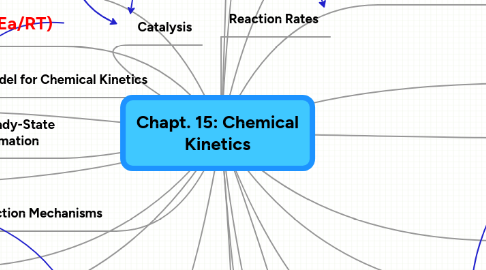Chapt. 15: Chemical Kinetics
by Michael Bonds

1. Catalysts create a new reaction pathway with a lower activation energy
2. Reaction Energy Diagram
3. k=AExp(-Ea/RT)
4. Catalysis
5. Steady state: Rate of I production = Rate of I consumption
6. A Model for Chemical Kinetics
7. The Steady-State Approximation
8. At equilibrium: Keq=kforward/kreverse
9. Key Terms: elementary step, intermediate, molecularity & rate determining step
10. Reaction Mechanisms
11. Reaction mechanisms can't be proven
12. Rate Laws: A Summary
13. To test a proposed mechanism, compare the rate law of its slowest step with the experimentally determined rate law
14. Pseudo-first-order: make one reactant in a multireactant rxn rate-limiting
15. Thermo: IF Kinetics: WHEN & HOW
16. Rate=Change in Concentration/Time interval
17. Rate Laws: An Introduction
18. Reaction Rates
19. Avoid complex kinetics by measuring initial rates
20. Rate Law: Rate=k[R]^n k & n must be determined experimentally
21. The rate law can provide information about the elementary steps of a reaction
22. Order=Sum of Exponents of Rate Law
23. 1st order half-life is independent of time or reactant concentration, 2nd order is not
24. Determining the Form of the Rate Law
25. The Integrated Rate Law


